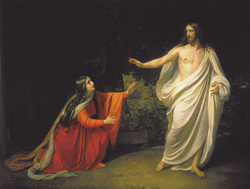
I would like to ask three leading questions this morning.
The first question is: Does anyone here have a garden?...
What does it look like? What do you do with it?
Do you realise we have a special garden – called a Quiet Garden – at St Mark’s? You might like to check it out sometime…
Gardens are so often a delight, aren’t they? – not least in this ‘Garden City’ of Toowoomba.
My second leading question is: Have you ever done anything wrong, or had something done to you, which was wrong, and which maybe made you feel bad or ashamed?... All of us I suspect!
Have you ever felt afraid, or suspicious too? Have you ever felt betrayed, or been betrayed?
Again, all of us experience these things, don’t we?
This part of what Holy Week, and especially Good Friday, is all about, isn’t it? - facing up to our sin and shame, our fear, suspicion and betrayals. So what then is Easter about? – and what has it to do with a garden? The answer is: a whole heap of beans, running over and flowing everywhere! When we see that our whole life is transformed, just like Mary Magdalene in our Gospel reading today: which leads to my third, and the most important, leading question of all in a moment…
Perhaps the most famous garden in the Bible is the Garden of Eden, isn’t it? Right near the beginning of the Bible we have the Garden of Eden, and, now, right at the end (or new beginning) of the story of Jesus, we have another garden. Do you think there is a link? Of course there is!
What happens in the story of the Garden of Eden?...
In that first garden in the Bible, we have what Christian theologians call the Fall: that is to say, a mythological account of why we human beings keep falling over; why we keep falling into sin and shame, into fear, suspicion, and betrayals – into all those things we remember on Good Friday and which led to the death of Jesus. Even if we don’t all read that story as literal fact, it is so true to reality, isn’t it? Isn’t it true that, whoever and whatever we are, sin and shame, fear and suspicion, and betrayal, cling to us? Yes? Yes, and No!
The story of the Garden of Resurrection which we hear today tells us something else about ourselves and our world. It tells us that the Fall is not the end: human beings are not condemned to sin and shame, fear and suspicion, and betrayal. It tells us that Resurrection is our new beginning: that, astonishing as it may seem, we are made right with God through Jesus Christ and that forgiveness and joy, trust and hope, and new life are our gift and future. All those things which do cling to us, are not the end. Sin and shame, fear and suspicion, and betrayal, may still be with us. In the power of the Resurrection however, they can be overcome. In other words, God’s garden is no longer closed to us. Through Jesus Christ, the garden of God is reopened to us. We are invited in to flourish: to plant and grow, to play and enjoy, not just for now, but for evermore. Wow! What an amazing message, eh? Hallelujah!
So my third, and most important leading question today is this:
Are you and I going to live in the garden of God?
Are we going to hang on to our sin and shame, fear and suspicion, and betrayal? Or are we going to receive the love of God which transforms them all and makes us new? In other words, are we going to take up the gift of the Resurrection?
In our Gospel story today, Mary Magdalene is just like us, isn’t she? She is full of sadness, because of all the sin and shame, fear and suspicion, and betrayal, she has felt and experienced. She is dwelling on deathly things, including the terrible sufferings and loss of Jesus. She is focused on the tomb: on death and the things of death. I think that is why she can’t at first recognise the risen Christ, don’t you? It is only when Jesus speaks to her that she begins to turn away from her fixation on deathly things and begins, dimly at first, to recognise the new life of Christ with her. Even then, she takes time to begin to figure things out. She is still clinging to what she wants to hold on to from the past. She is slow to move on.
Mary Magdalene did take up the gift of Resurrection. She did open here eyes and ears, and whole self, to the new reality and power of God’s love. She did stop clinging to the past. She did let the love of God transform her fallen nature: all the sin and shame, fear and suspicion, and betrayal, she felt. Will we do the same?
Today – Easter Day – is a magnificent opportunity to take up the gift of the Resurrection, to let go and to let God. We do not have to stay in the tombs of our own or others’ making, or fix our eyes and ears on death. Through Christ, the gates of God’s garden are open to us again. Let us then, like Mary Magdalene, enter into God’s garden. Let us enjoy the delights of God’s astonishing freedom, love and flourishing. Our sin and shame, fear and suspicion, and betrayals, are not the end. The seed of God remains in us. Let us then be planted in God’s new life and grow, and let us nurture the seeds of others. For beyond death lies new life, as all great gardeners know.
In the name of Jesus the Christ, who lived and died, and was risen for us. Amen.
 RSS Feed
RSS Feed